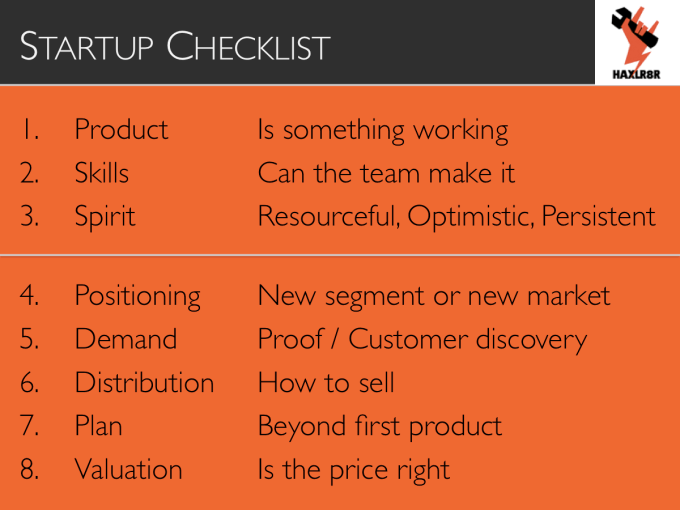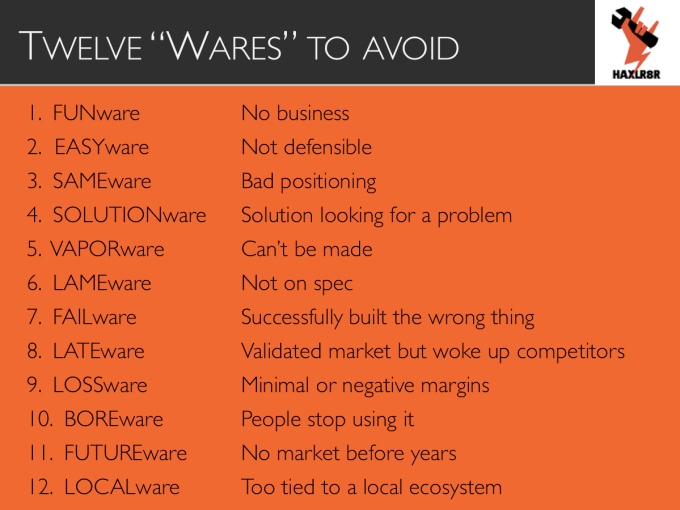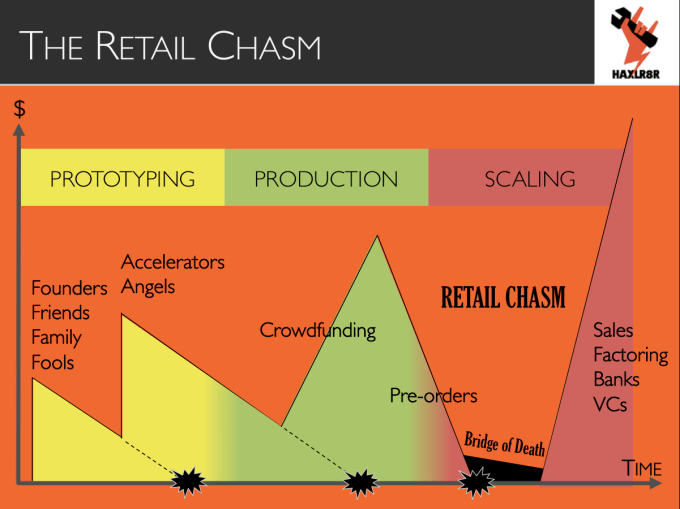Editor’s note: Cyril Ebersweiler is the founder of the pioneering hardware startup accelerator HAXLR8R (which is now looking for applicants) and Partner at SOSVentures. Benjamin Joffe is an expert on startup ecosystems, angel investor and Advisor at HAXLR8R. Both invest in companies around the world and spent over a decade in China and Japan.
This is the fourth part of a series on Lean Hardware.
Nest and Oculus got acquired for billions, Jawbone and GoPro are going IPO, multiple projects are crossing the $1 million bar on Kickstarter. Something is happening in hardware.
Yet many investors from angels to institutional investors are still reluctant to get into hardware before it’s a proven market. At HAXLR8R we typically invest a year before the product hits the market. Here is some of what we learned doing it across over 40 startups.
The future is already there — it just hasn’t launched on Kickstarter yet
Our investments range from smart kitchen appliances, flying machines, hardware cloud platforms, wearable EEG headgear, and even smart vibrators. We cover a fairly good cross-section of what is going on in hardware. We also learned and wrote about iterative prototyping, production, financing and positioning during the four acceleration programs we ran.
As part of the recruiting phase we also receive hundreds of applications. This gives us a sense of near-future innovations. We also have the tough challenge of selecting for our program the startups we believe we can help shape into businesses worth hundreds of millions of dollars.
Checklist for startups

Our focus is early-stage investment. We look typically at those who reached the prototype stage, so we have built a checklist to narrow down choices. We generally don’t consider products at the “idea” stage that are not brought by successful repeaters or unless they have a solid indication of demand (from extensive customer discovery, for instance).
We start the list with “Is something working?” on the product side. Are all necessary skills covered from mechanical, electrical, software engineering? Is someone in charge of business / customers / sales? Along with those two, another necessary element is to have the right spirit: a combination of optimism, persistence and resourcefulness. This is often fueled by a sense of mission.
Other things we look at but are more “fixable” are positioning, demand, distribution and an inspiring vision beyond the first product.
Hardware is not enough
Many new hardware products are coming out because smartphones have changed both the economics of sensors and displays but also brought affordable connectivity via Bluetooth or Wi-Fi.
Yet, pure hardware is at risk to be copied and commoditized quickly. To have a defensible competitive advantage, a startup must be doing something that is hard to do. We see three things that can make a key difference: software, manufacturing knowledge and community.
Putting together some sensors, connectivity, a battery, a nice form factor will most often be just an entry point to software, where the hard IP is.
Mastering manufacturing is a hurdle for many hardwarians, and many see it as a necessary evil rather than a key skill and asset. Our view on this is summarized by the first rule of Lean Hardware: “No hardware plan survives contact with a factory.” Learn the tools that make the things, and leverage the expertise of production engineers to find better solutions. Startups who master manufacturing will strive. While not a startup, Apple is an obvious example.
Last, a community assembled to support the product can be a very valuable asset. This is certainly the case for GoPro, Makerbot and Oculus.
Beware of those 12 “wares”

Beyond the accelerator program, we found that having more vocabulary to talk about hardware informed our thinking. This is how we defined this list of “-wares” that raise red flags for investment. If you can think of more, comments are welcome!
The first one is a frequent case in the maker community. We call them FUNware. While those products ask interesting questions and offer surprising answers, they don’t qualify as startups. For instance, the “Chindogu” movement launched by Kenji Kawakami is about funny and creative inventions.
Along with those, here are the 12 “ware” categories to be careful with.

Here’s the breakdown:
FUNware is not a business.
EASYware is not defensible.
SAMEware is not positioned well enough.
SOLUTIONware is the typical project coming out of universities: great technology in search of applications. We also say it has a “hammer” problem: I have a hammer so there must be nails! We take only a few of those in every accelerator batch because they require much more effort for product/market fit, positioning and customer discovery.
VAPORware is an increasing occurrence on crowdfunding platforms. When not a complete scam, it is naively optimistic and end up not shipping.
LAMEware did not keep its promise and ships a mediocre product.
FAILware kept on specs but successfully built something nobody wants.
LATEware validated a market (via crowdfunding, for instance) but handled manufacturing so badly it shipped after the competitors it woke up.
LOSSware has been priced badly and can’t make a profit. Frequent in crowdfunding, too. While it might ship to its backers (sometimes at a loss, or forcing founders to eat ramen for a year) it will never cross the Bridge of Death (https://techcrunch.com/2013/11/28/financing-lean-hardware/).
BOREware gets boring after a short time. From a few conversations we had with wearable enthusiasts, a current big trend in wearables is to stop wearing them.
FUTUREware is so futuristic that the majority won’t buy it until many moons have passed. The company will have a hard time keeping the lights on waiting for its market to come to age.
LOCALware is so tied to the local ecosystem it can’t be done elsewhere. In Japan this is known as the “Galapagos Syndrome” with things like the i-mode (precursor of the iPhone app ecosystem), FeliCa NFC technology and many more things.
Can you think of products in those categories? If it’s a successful project it probably never fell into any of them during the life cycle.
At what stage do you invest?
Each investor has his or her favorite timing depending on fund size and economic model: starting from concept to various levels of prototype development; post-Kickstarter when demand has been proven; after shipping when ratings start coming in; and when scaling retail or pre-IPO.
On the startup side, cash flow can be hard to manage and fundraising might be necessary at stages that are not optimal — in particular the dreadful “Bridge of Death” after the first shipment to backers. This is the time when a startup gets paid last, rather than first in the case of crowdfunding.

HAXLR8R focuses on the prototype stage, with the aim to bring the company to its first shipment. The fund at the origin of the program, HAX, has invested at later stages in companies such as Leap Motion, FormLabs, Incident gTar and more.
Investor interest rises when risk goes down, and hardware is the riskiest before good reviews come in. A strong Kickstarter proves some demand but not if backers will be satisfied with the product, neither if the product can actually cross the chasm beyond innovators and early adopters.
From our observations, if a project goes the crowdfunding route, a VC will generally not consider it unless it passes $1 million. Angels might be keen above $250k, often matching your backing with a similar amount.
Without a Kickstarter, founders had better be repeat entrepreneurs, have knowledge of manufacturing or pitch something extremely inspiring.
What might come next?
We believe we are at the dawn of the second wave of the hardware revolution. The first generation consisted of products that had just been made possible: trackers, 3D printers, drones, etc.
While they were breaking ground in their own right, they also had major flaws.
Trackers provided data that was not very meaningful, not very fun and often failed at helping build new habits or leverage existing ones.
Desktop 3D printers were now affordable but too slow to be turned into businesses — the manufacturing revolution will need affordable, fast and high-quality printers.
Drones were fun to fly for hobbyists but were prevented from building larger businesses such as delivery by performance and regulations.
The second wave will soon be upon us: more fun and habit-forming, social and viral, personal and contextual.
Startups are now embedding tech into ‘real’ things, impacting the way we’ll learn tennis or skateboarding, for example. This new wave will finally be a force to influence strong habits such as sitting with the right posture or smoking cessation. Computer vision and robots are getting to the point where they will be affordable to small businesses in areas such as cleaning or painting. We will display this explosion of innovation in May at our San Francisco Demo Day.
We believe the future of hardware does not have to be a smart-pocalypse. As investors, we can make a difference in bringing thoughtful products to the world.






























Comment